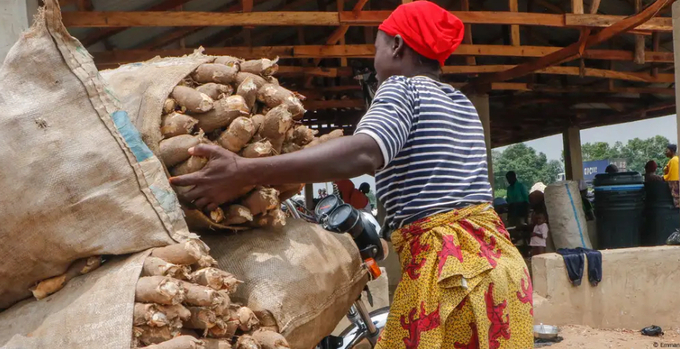November 28, 2025 | 02:54 GMT +7
November 28, 2025 | 02:54 GMT +7
Hotline: 0913.378.918
November 28, 2025 | 02:54 GMT +7
Hotline: 0913.378.918

The Nigerian government has announced an agricultural investment plan that includes boosting productivity in staple cropsImage.
Nigeria has secured a loan of $134 million (€127 million) to invest in farming, Agriculture Minister Abubakar Kyari announced on Thursday.
President Bola Tinubu's government has previously said that boosting food security is a goal of his administration.
Kyari said in a post on social media that the plan aimed "to boost productivity in key staple crops, including wheat, rice, and maize, for both dry and wet season farming."
He said that Nigeria's federal government planned to "provide subsidized agricultural inputs to 250,000 wheat farmers and 150,000 rice farmers this season" as part of its agricultural support program.
The minister said the government would "establish a minimum guarantee price for crops, helping to stabilize farmers' incomes and reduce reliance on imports."
The $134 million loan was secured from the African Development Bank.
Around 25 million Nigerians face "acute food insecurity," according to figures from the Cadre Harmonise — a tool for assessing food security. This number is expected to rise to 33 million in 2025.
The report cited the economic effects of the continuous devaluation of the Nigerian currency, the naira, against the dollar and Tinubu's decision last year to abolish a fuel subsidy that had been in place for decades. In June of this year, annual food-price inflation was recorded at 40.9%.
Northern Nigeria has become increasingly arid due to climate change and deforestation while violence and desertification have sparked conflicts between farming communities and nomadic herdsmen.
Last month, 1.6 million hectares of farmland were destroyed in central Nigeria by torrential rains.Western and central African countries were also hit by flooding in September.
(DW)

(VAN) According to Mr. Vo Minh Thanh, Director of the Tay Ninh Department of Agriculture and Environment, Resolution 57 has created a new development pathway for the locality, shifting from traditional toward modern agriculture.
/2025/11/26/4909-2-154329_878.jpg)
(VAN) Pearl grouper farming in HDPE cages not only delivers economic efficiency but also contributes to protecting the environment, creating jobs, and promoting marine-based experiential tourism.

(VAN) The model of making a living under the forest canopy through the agroforestry system in Van Son commune, Bac Ninh province, is expected to generate an annual income of approximately VND 30 million/ha.

(VAN) Many enterprises in Can Tho are harnessing natural energy and reducing greenhouse gas emissions in their production processes, thereby contributing to the promotion of a sustainable green transition.
/2025/11/24/3536-2-112800_176.jpg)
(VAN) Dong Nai now has tens of thousands of hectares of forests certified for sustainable management, and this area will continue to be expanded in the coming period.

(VAN) Vinh Ha hamlet (Dai Xuyen commune, Hanoi) is shifting away from small-scale farming as households adopt bioscurity into their breeder chicken models.

(VAN) Heavy rains make aquatic species more vulnerable to disease. Proactive water management and high-tech systems help farmers prevent outbreaks and protect yields.